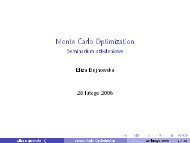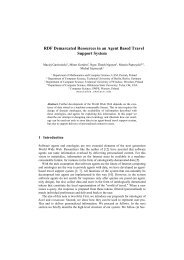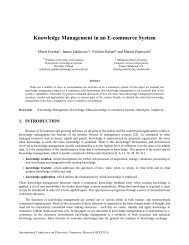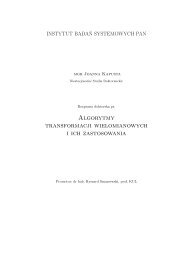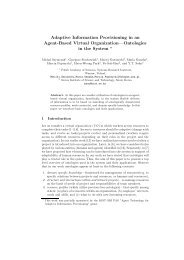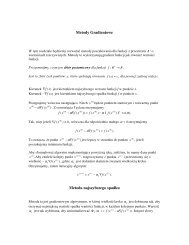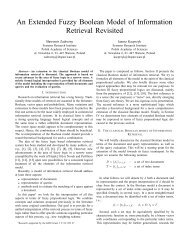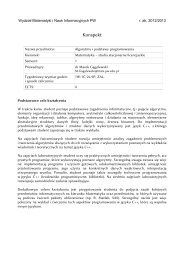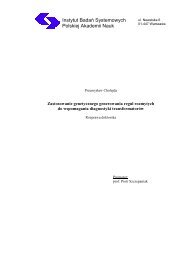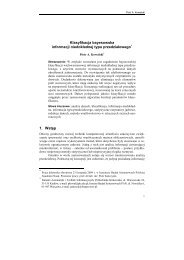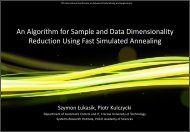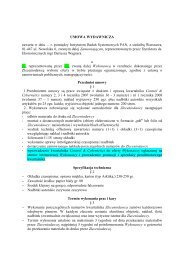Combining Information from Multiple Internet Sources
Combining Information from Multiple Internet Sources
Combining Information from Multiple Internet Sources
You also want an ePaper? Increase the reach of your titles
YUMPU automatically turns print PDFs into web optimized ePapers that Google loves.
10 http://www.mises.org/story/2451<br />
# Yahoo Interia<br />
http://www.marginalrevolution.com/margina<br />
lrevolution/2004/05/<br />
http://www.msu.edu/course/aec/810/studyno http://plato.stanford.edu/entries/Game<br />
1<br />
tes.htm<br />
theory/<br />
http://www.cit.gu.edu.au/~s2130677/teachi http://www.ejournal.unam.mx/cys/vol03-<br />
2<br />
ng/Agents/Workshops/lecture07.pdf 04/CYS03407.pdf<br />
http://home.earthlink.net/~peter.a.taylor http://updatecenter.britannica.com/eb/art<br />
3<br />
/manifes2.htm<br />
iclearticleId=109420&pid=ursd07<br />
http://www.people.hbs.edu/mbazerman/curri<br />
4 http://aufrecht.org/blog/swcat/39172<br />
culum_vitae.html<br />
http://www.concurringopinions.com/archive http://doi.ieeecomputersociety.org/10.110<br />
5<br />
s/economic_analysis_of_law/index.html 9/TSE.2003.1237173<br />
http://dotearth.blogs.nytimes.com/2008/01<br />
/13/a-starting-point-for-productive-<br />
http://wwwstatic.cc.gatech.edu/~jp/Papers/Zagal<br />
et<br />
climate-<br />
discourse/index.htmlex=1357966800&en=2de al - Collaborative Games - Lessons<br />
6<br />
12bb5c6f809de&ei=5088&partner=rssnyt&emc= learned <strong>from</strong> boardgames.pdf<br />
rss<br />
7 http://aws.typepad.com/aws/2005/01/ http://www.kestencgreen.com/kgthesis.pdf<br />
http://www.ferc.gov/legal/maj-ordreg/land-docs/oligoply.pdf<br />
01237173.pdf<br />
http://ieeexplore.ieee.org/iel5/32/27736/<br />
8<br />
http://www.drownout.com/blog/archives/cat http://ieeexplore.ieee.org/iel5/8856/4266<br />
9<br />
_reading_list.html<br />
804/04266807.pdf<br />
http://www.indiana.edu/~workshop/wsl/game<br />
the.htm<br />
Table 4.3.5 Results of Consensus method and search engines for very complex query<br />
10 http://osnews.com/comments/10354<br />
Consensus Ask.com Live Interia Yahoo! Google<br />
Set Coverage 10% 20% 90% 20% 40%<br />
URL to URL 0% 0% 30% 0% 0%<br />
Table 4.3.6 Coverage of Consensus method and search engines for very complex query<br />
It can be observed, <strong>from</strong> the table above that Consensus method presents the highest setcoverage<br />
of all three methods. The result set of Interia engine is the most covered (90%) result set<br />
of all search engines. The lowest coverage (10%) is in the case of the Ask.com search engine. Also<br />
the result set of Interia engine is the most position-wise covered. Other result sets have 0% of URL<br />
to URL coverage.<br />
In this case, like for the previous ones, the Consensus answer was said to be inconsistent.<br />
Once again, this is because of large dispersion of result sets provided by all search engines.<br />
Levenshtein distance, as being highly dependent on the URL positioning, is returning large values<br />
of distances between result sets, thus resulting in the final answer being said to be inconsistent. The<br />
URL to URL coverage exposes this fact further. Only the one engine has the non-zero URL to URL<br />
coverage, which results in high value of the average of distances <strong>from</strong> consensus answer to all result<br />
sets. Nevertheless, this method reflects the most common view of all search engines as it should,<br />
since the building of the result set is purely based on average ranks of URLs. In the final result set<br />
there are the most common URLs which are present, as top results, in most of the search engines.<br />
65



